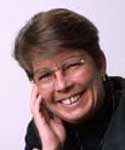-
- Government puts new restrictions on AIDS funding
- Gay rights activists see hope in Oregon Senate’s civil unions vote
- Government seeks dismissal of ‘Don’t Ask, Don’t Tell’ challenge
- Fire found in Virginia church, anti-gay messages found outside
- Review substantiates concerns at U.S. AIDS research
- ABC finds a neighborhood that isn’t too friendly
- University of Florida alumni group apologizes for honoring gay-hunting governor
- National News Briefs
- World News Briefs
commentary
More than crystal continues to affect us
Published Thursday, 14-Jul-2005 in issue 916
CENTER STAGE
Last month more than 125 community members gathered at The Center to begin a dialogue about the crystal methamphetamine problem that is impacting our community nationally, statewide and locally. The goal of the San Diego LGBT Community Leadership Council that evening was to end the silence that has surrounded this crisis in San Diego, get educated, and begin a constructive and compassionate discussion of the problem.
As a result of the growing attention to the crystal methamphetamine crisis, many communities are attempting to grapple with all of the complexities of the crystal issue. Forums on crystal methamphetamine like the one held at The Center have been occurring in most major cities across the country. And, as more people are educated about the facts concerning crystal methamphetamine, our communities are beginning to identify the larger questions associated with the crystal crisis. Collectively, we are talking more honestly about the real reasons why the LGBT community seems particularly hard hit by this drug.
At our forum, Dr. Neva Chauppette frankly asked, “We have to ask ourselves why we are still destroying ourselves. Why are we engaging in behavior that takes away what we’ve worked so hard to achieve: a validated life existence as an LGBT person?”
Despite the progress we have made locally and nationally, we are still suffering from too many problems that are seemingly self-inflicted. Despite all our growth as a community, social homo-negativity and unequal human rights continue to have a profound and devastating impact on all of us. It impacts our health, our quality of life and our fundamental sense of ourselves as valuable, important members of our nation and our cities.
“You cannot be inundated daily with the voices of hate and ignorance without some consequence, and that is particularly true for our vulnerable youth.” In 2005, even in progressive California, we are all affected by the steady drumbeat of anti-LGBT discrimination. Preparing to fight yet another discriminatory ballot measure, which seeks to deny our ability to create and care for our partners and our families, not only takes away our civil rights – it takes a toll on us personally and as a community. You cannot be inundated daily with the voices of hate and ignorance without some consequence, and that is particularly true for our vulnerable youth. The “culture wars” are not without victims, no matter how much we all resist that label.
We have long known that LGBT people suffer from proportionally higher rates of suicide, depression and anxiety. However, we also know that those rates of distress are not related to simply being LGBT. It’s not in our genetic material – instead, the root causes of those symptoms of distress are found in the negative, unequal treatment community members continue to experience. The long-term impact of discrimination upon our community members, particularly our most vulnerable, is clear.
Like many behavioral health professionals, I believe the crystal methamphetamine crisis is yet another manifestation of the damage discrimination and inequality brings. Any of the communities of color who are also dealing with the ravages of substance abuse could have educated us about this.
Recreational drugs provide welcome relief from the chronic, internal tensions of negativity. Moreover, crystal is a drug that makes sex (at least initially) an incredibly awesome experience. How could this not be extraordinarily tempting for men who have been told their entire lives that their sexuality makes them evil and perverted? The longing to be free is understandable and overwhelming for many. Who among us doesn’t long to be able to “dance like no one is watching”? While we seek ways to deal with this methamphetamine crisis now, we must also be cognizant that our work will only be temporary unless we continue to combat the inequality that exists within our larger society.
The Center’s Health Services department announces the formation of a new, free service for HIV-positive community members called “PNP,” Preventing New Problems Group, with Dr. Michael Majeski. PNP is a support group designed to help HIV-positive community members with substance use problems, especially crystal meth, and develop a set of skills that support living drug free. Groups will be held weekly on Fridays, from 6:00 to 7:30 p.m. beginning Aug. 5. For more information, please contact Caroline Higgins at (619) 260-6380 ext. 105 or Dr. Michael Majeski at (619) 260-6380 ext. 116.
|
|
Copyright © 2003-2025 Uptown Publications


